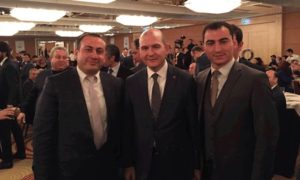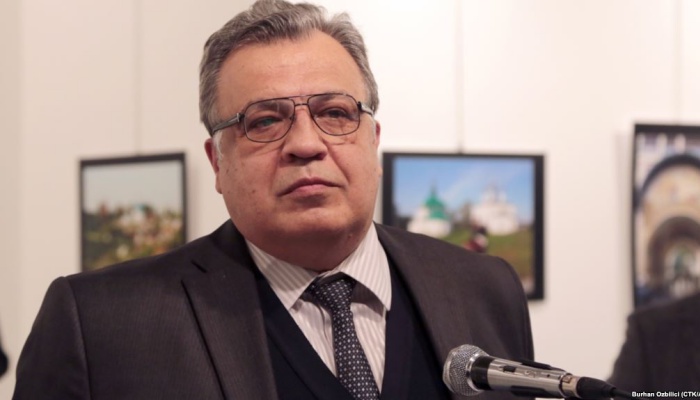Almost two years after the incident, a Turkish prosecutor finally has come up with an indictment concerning the assassination of Russian Ambassador to Turkey Andrei Karlov, accusing the Gülen movement of orchestrating the murder, as usual.
Mevlüt Mert Altıntaş, the police officer who assassinated Karlov, was killed at the scene, even though he could have been taken alive by the police. Therefore, the indictment only focuses on the hitman’s so-called connections to police officers who are allegedly affiliated with the movement.
The prosecutor’s indictment only serves to “legitimize” statements made by President Recep Tayyip Erdoğan and his government blaming the movement for the assassination.
Other suspects are Fethullah Gülen, a US-based Islamic cleric who condemned the assassination and strongly denied the charges, and Emre Uslu, a former police officer and columnist who resides in the US.
The prosecutor presented a tweet posted by Uslu as evidence of his connection to the murder.
What are the facts?
The assassin Altıntaş went home sick from work on Dec. 19, 2016. He later took a taxi and joined the Karlov security detail posing as a bodyguard.
When the Russian ambassador entered the room at the Ankara Contemporary Art Center where he was to speak, Altıntaş took a position that would give him a clear shot.
At some point he uttered something in Arabic, a war chant used by the Al Nusra Front, a well-known jihadist organization fighting in Syria against Russian and Syrian troops.
He fired 11 shots, hitting Karlov nine times.
In the days following the assassination, a Turkish official told Reuters that the Gülen movement was behind it.
This was a continuation of a government narrative that was made up to repair strained relations with Russia after Turkey downed a Russian plane near the Syrian border in November 2015.
The soldiers who executed the hit were accused of being followers of the Gülen movement, although then-Prime Minister Ahmet Davutoğlu said he personally gave the order to shoot the plane down.

In line with the official narrative a pro-government journalist claimed that Altıntaş had gone to a prep school linked to the movement; however, the family of the assassin denied it.
Another claim was that he was dismissed by his superiors after a coup attempt in July 2016 due to his suspected affiliation with the movement, which was accused of orchestrating the failed coup although it strongly denied any involvement.
This time the police department refuted the claim on Dec. 21, 2016.
During the early months of a state of emergency declared immediately after the coup attempt, more than 10,000 police officers were dismissed by government decrees, although Altıntaş was not one of them.
Moreover, according to pro-government media reports, Altıntaş had served on police details backing up President Erdoğan’s personal bodyguards eight times since the coup.
The investigation was conducted with the cooperation of officials from Ankara and Moscow, but the Russians never showed great enthusiasm.
What was his motive?
In an interview the Altıntaş family stated that he had been attending the sermons of Nurettin Yıldız, a radical Islamist figure who has close relations with jihadist groups in Syria.
Yıldız was a well-known preacher among jihadist circles.
In a propaganda video of Tahrir al-Sham, the largest rebel group in Syria’s Idlib region, one of the leaders of the organization promoted Yıldız’s book to the rebels, according to a Sputnik Turkish service report in May 2017.
Also a photo was leaked to the Turkish media showing Yıldız with Abu Abdullah al-Hamawi, the former leader of the Ahrar al-Sham organization, which was backed by Turkey.
Following al-Hamawi’s death in 2014, Yıldız extended his condolences in a written statement praising his “jihad” and pointing to him as an example.
Yıldız occasionally receives letters of support from rebels, published on propaganda websites of Turkish jihadists based in Syria.
Both Tahrir al-Sham and Ahrar al-Sham were previously operating under the Al Nusra Front.
In October 2016 President Erdoğan told mukhtars (neighborhood headmen) at his palace that Russian President Vladimir Putin had made a request of him concerning the withdrawal of the Al Nusra Front from Syria’s city of Aleppo, which was in the hands of the rebels at the time.
These jihadist groups have recently been positioned in Idlib, and Erdoğan again has been playing the part of a mediator between the rebels and the Russian president.
Occam’s razor
The indictment concerning the assassination actually does not deny the assassin’s affiliation with radical cleric Nurettin Yıldız and his circle, but it basically says that Altıntaş infiltrated Yıldız’s group so as to appear to be one of them, although he was a follower of the Gülen movement.
That is why the prosecutor issued detention warrants for former police officers who were allegedly linked to the movement in order to build a connection between Altıntaş and Gülen.
Some of these policemen claimed that Altıntaş attended movement sermons before 2013, when Erdoğan and Gülen parted ways.
But even the testimonies that that prosecutor refers to only bolster the idea that Altıntaş was a radicalized young police officer who was concerned about the Syrian civil war and was searching for a way to do something about it. The connection to the Gülen movement remains vague.
The principle of Occam’s razor, which prioritizes the simplest explanation that requires the least speculation, dictates that the Russian diplomat was plainly killed in response to the Russian and Syrian military operation in rebel-held Aleppo at the time.
It is no secret that Turkey has relations with almost every faction of the Syrian armed opposition, and there are thousands of Turks fighting with them, but the right question to ask is how much the ideologies of those radical Islamist groups affect the Turkish public, including police and military personnel.


